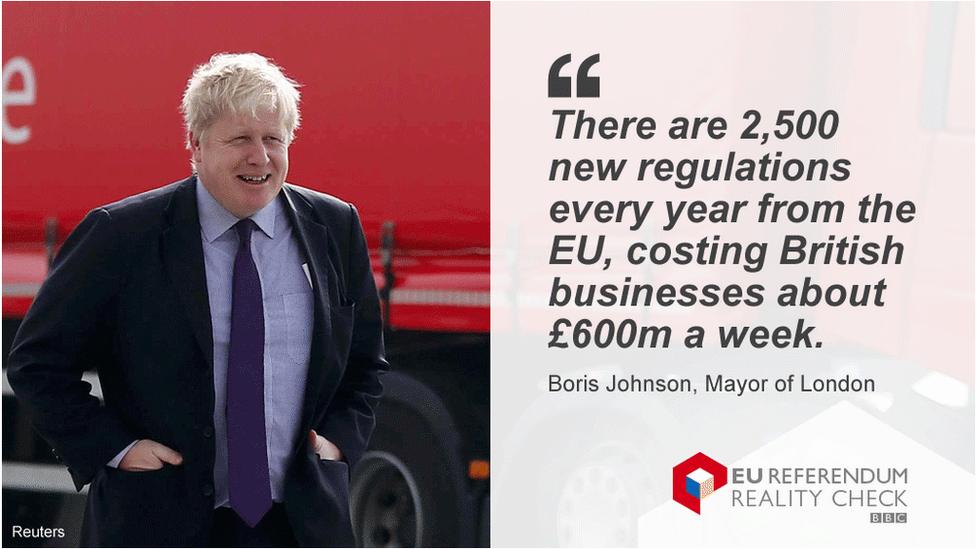Reality Check: Are there 2,500 new regulations every year from the EU?
- Published

The claim: There are 2,500 new regulations from the EU every year, which cost British businesses £600m a week.
Reality Check verdict: In recent years the number of regulations has been below 2,500. The cost figure excludes any benefits from the regulations and it is not clear how much of that money could be saved by leaving.
Thousands of European Union regulations and other laws have been adopted over the years to set out the rules of the single market.
In the 1980s and 1990s the number of EU regulations was high. In 1983 alone, the number exceeded 14,500. , external
In recent years, the number has gone down considerably. In 2015 the EU adopted, external 839 new regulations and 430 amending regulations: a total of 1,269, not 2,500.
Regulations are EU laws that take effect without any need for additional national legislation.
Some of the regulations have no impact on UK businesses, as they have nothing to do with them. For example, regulations governing the production of olive oil and the growing of tobacco have little impact on UK farmers.
The EU also agrees a number of directives every year. Directives are EU laws that give "direction" or "goals" that all EU countries must achieve through their national parliaments. In 2015, the EU adopted 10 new and 26 amending directives.
How much does it cost?
So, what is the balance of cost and benefits that those EU rules have in the UK? And would their cost be eliminated if the UK left the EU?
In 2015, Open Europe, external, a think-tank calling for reform of the EU, published a study that looked into 100 EU laws that are considered most burdensome to the UK economy as a whole. It concluded that they cost the UK economy £33.3bn a year, or £640 million a week.
The study was based on the government's impact assessments, which look into the cost and benefit of every new EU law to the UK economy. The government said the benefits of those 100 rules exceeded the costs, leaving the UK economy better off by £25.3bn year or £487 million a week.
Open Europe acknowledges there is a benefit as well as cost to those rules, but argues that 95% of the benefits envisaged by the government had failed to materialise. For example, the think-tank said there were no benefits from the EU's climate targets because a global deal to reduce carbon emissions had not been agreed yet.
Crucially, however, Open Europe pointed out that leaving the EU would cut some of the costs but would not eliminate them, because "the UK would still need to ensure that it came into line with European rules on trade for all commercial transactions with EU member countries".
Note: This post originally appeared on the Reality Check live page on 14 March.



- Published22 February 2016
